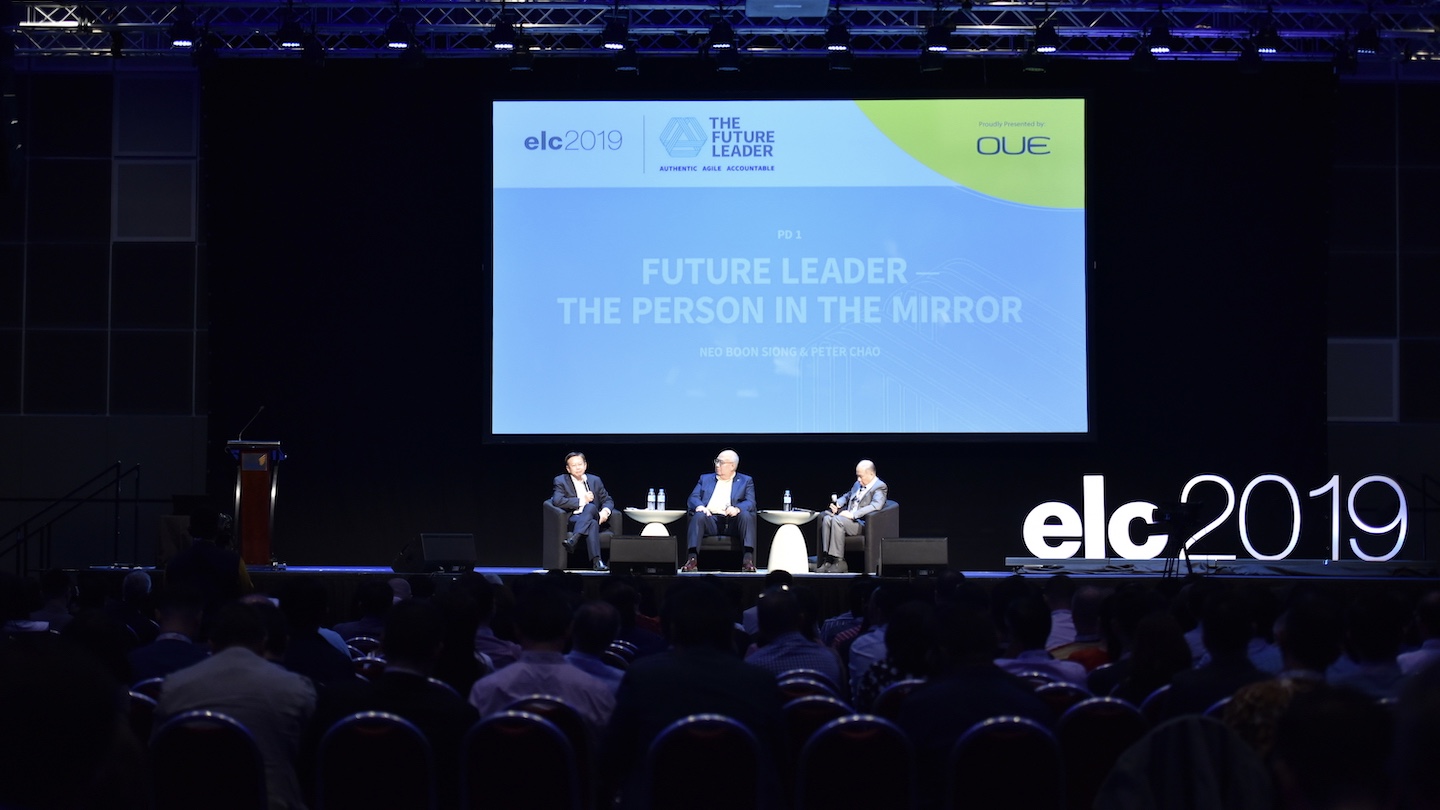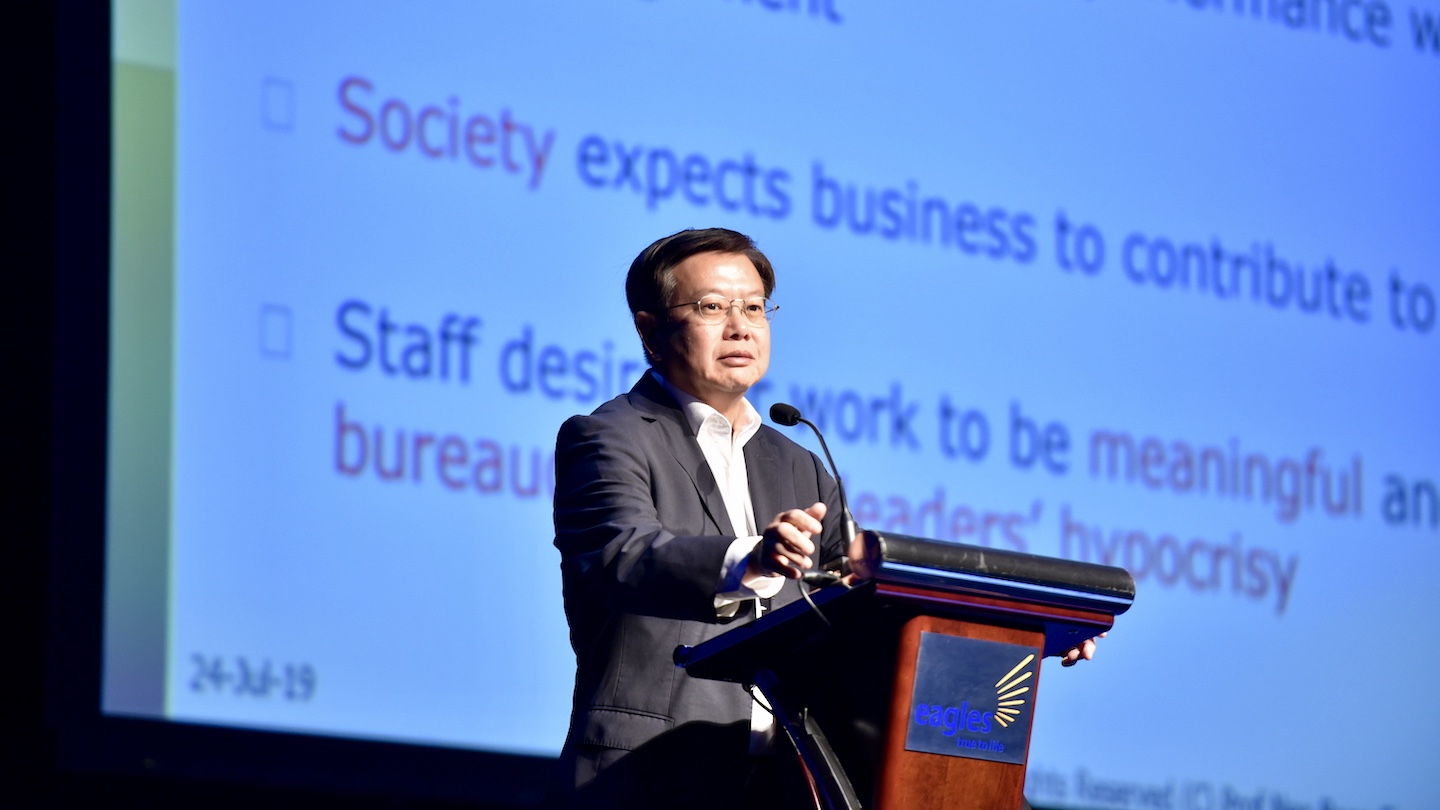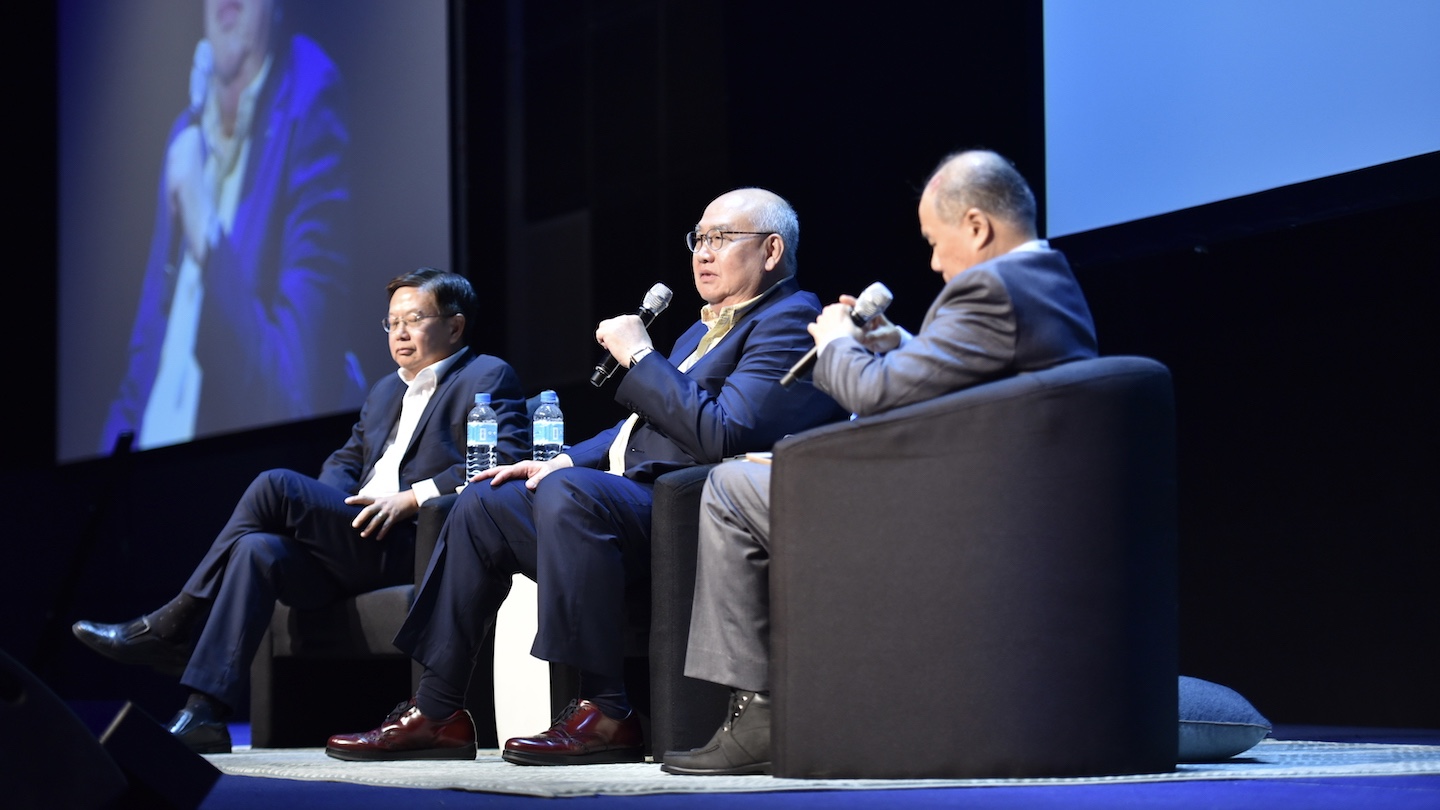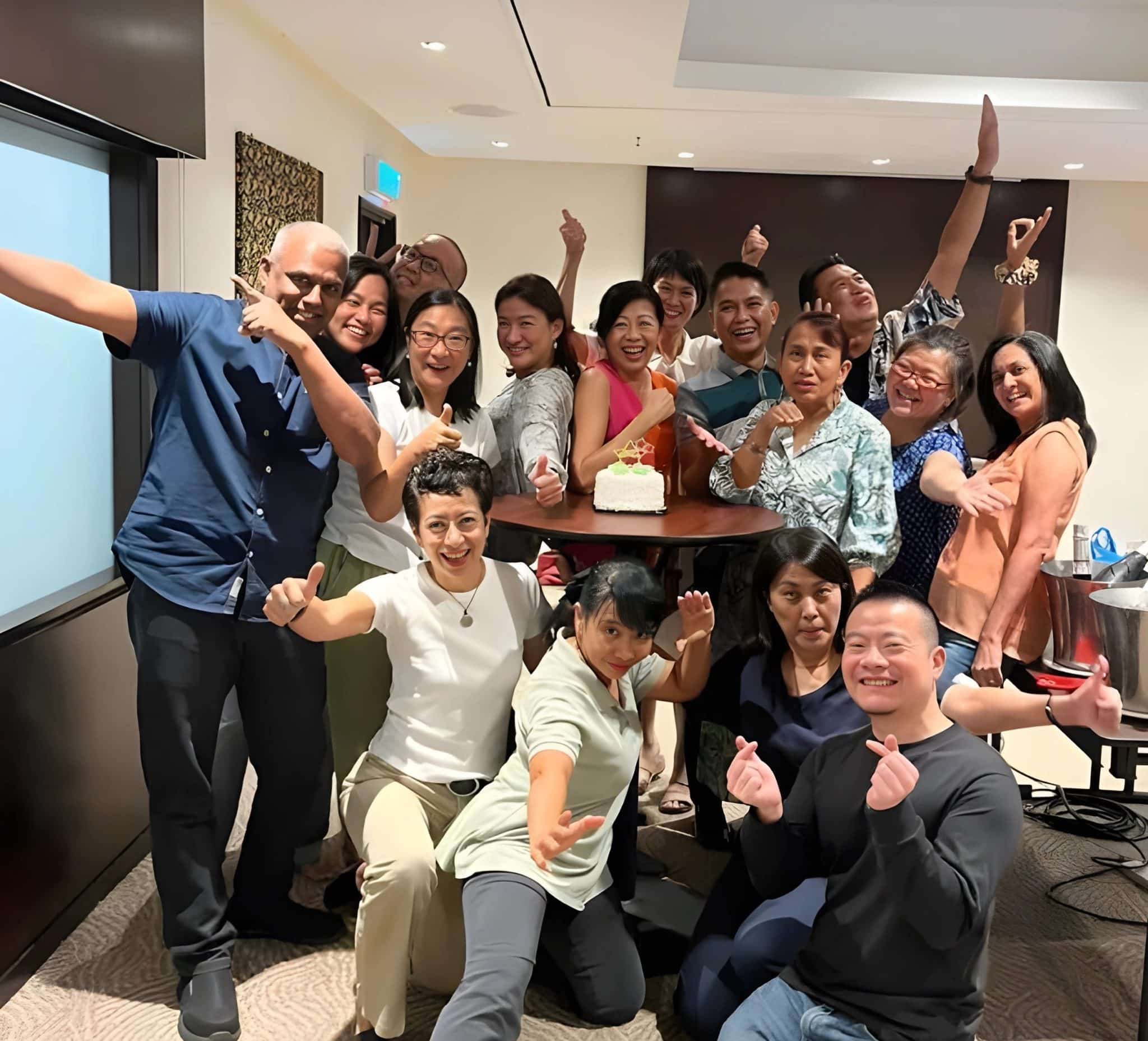“Don’t aspire to lead, aspire to serve”: Nanyang Business School’s Prof Neo Boon Siong
by Geraldine Tan // July 27, 2019, 12:27 am

The leaders of today, and the future, need to be authentic, agile and accountable, say Professor Neo Boon Siong and Peter Chao at a plenary dialogue at the Eagles Leadership Conference. All photos courtesy of Eagles Communications.
“Give me leaders that I respect. Not leaders who are hypocrites; not leaders who are there because of their seniority or their length of tenure.”
Those were the words of the young people whom Professor Neo Boon Siong spoke to.
“It represents in a nutshell the sentiment of the kind of people we’re trying to lead, now and in the years ahead,” said Prof Neo, former Dean and Canon Chaired Professor at the Nanyang Business School, Nanyang Technological University.
He was speaking at a plenary dialogue at the Eagles Leadership Conference held at the Suntec Convention Centre on July 25, 2019.
This is an issue that many in attendance were grappling with. Among the 1,300 in attendance, more than a third are C-suite leaders, business owners and general managers.
The digital age has turned leadership on its head.
Many of the young have knowledge and skills that leaders often do not have. They are more tech savvy and more globally connected. Their motivations are also different – they desire work to be more significant and meaningful, even if it means drawing a smaller pay cheque.
The leadership model where experience gives one the authority to dictate next steps no longer holds true.
Is experience still relevant?
The short answer is yes. But it comes with caveats.
“It still matters to the extent that we learn how to draw the insights and wisdom from our experience. And have an open mind to learn and to co-create with the people we work with,” said Prof Neo, who is also a director on the boards of Keppel Telecommunications & Transportation and OUE REIT.
“Without your rank, your position, your title, would anyone willingly follow you?”
“The practices that we are used to when we grew up in our seniority – that we decide and other follow; using authority to coerce action; depend on formal, regular reports to track development; hire staff like HR and finance to control staff; or to ensure compliance through inducement or punishment – these practises are no longer adequate.”
How then should one lead?
“Start with who we are,” said Prof Neo told the rapt crowd.
It is a view echoed by fellow plenary speaker, Peter Chao, founder of Eagles Communications: “Who we are always seeps out in everything that we do and we say.”
The need for authenticity
“Without your rank, your position, your title, would anyone willingly follow you?” questioned Professor Neo.
What does it take to be an authentic leader?
Firstly, realise your uniqueness. Each of us is uniquely created (Psalm 138:14) and that determines how we serve and make an impact, explained Professor Neo.

The top-down leadership style we are accustomed to is outdated. Now, it needs to “start with who we are”, said Prof Neo.
Secondly, recognise your blind spots. Successful leaders are susceptible to an inflated ego, which risks them ignoring those that disagree with them.
“After a while, you become blind because nobody will tell you when they don’t agree with you. And the tragedy is that what made us successful can also kill us,” he warned.
Lastly, reinforce impact by building trust. “When people trust and respect us, we generate commitment rather than mere compliance,” said Prof Neo.
“Leaders, no matter what they know and the skills they possess, if people don’t trust and respect them, they will not have followers.”
Agility and accountability
We operate in a volatile, uncertain, complex and ambiguous world, hence the need for agile leadership.
It is not simply about speed and flexibility. Leaders need to have clarity of purpose and strategic direction.
“Be confident enough to act, yet hungry enough to learn and adapt.”
But Prof Neo cautioned against waiting for total clarity before we act as the delay may deny us options.
Agile leaders need to be bold and take action on the initial steps. They also need wisdom to sense the responses from stakeholders and interpret their reactions as “initial responses are almost universally negative”. From there, exercise judgement on how to respond thereafter.
“Be confident enough to act, yet hungry enough to learn and adapt,” advised Prof Neo.
He also conceded: “The kind of agility that is required for us to be effective, to get the impact that we want, puts us under significant pressure.”
The pressure to meet stakeholder demands may lead to bad decisions.
“Accountability means that we need to be able to give an account for the resources entrusted to us,” he said.
This does not just relate to financial resources, but human resources.
“We are careful not to waste money but many of us waste people’s time and energy. Why are we not accountable for that?” asked Prof Neo.
“We are careful not to waste money but many of us waste people’s time and energy.”
He urged leaders to model servant leadership, an idea popularised by Robert Greenleaf in modern times, but was actually first taught by Jesus in Mark 10:42-45.
“Don’t aspire to lead, aspire to serve.”
But do not mistake this as being doormats; what it means is to put the interest of the staff and organisation before your own and working in the trenches together.
“How many people working with you or for you, if given an opportunity, would say, ‘I’m willing to do even more because it is meaningful. I can see the result of what I do. And I’m learning and growing at the same time’?” Prof Neo challenged the crowd.
Will anyone follow you?
“When leaders treat followers or employees in such a manner, there will be no loyalty and no commitment,” warned Chao.
He told the audience, comprising participants from nearly 20 different nations: “A perceptive leader will not only respect the dignity of the person who is working for, or with him or her, but will always find ways to create an oasis in the workplace where meaningful relationships can be nurtured.”

“Leaders who are humble understand that they cannot discharge their responsibilities without others,” said Chao.
When this happens, an employee’s self-worth soars and commitment to the company will increase.
“Leaders who are humble understand that they cannot discharge their responsibilities without others,” noted Chao, for if there are no followers, there will be no leaders.
“How many of you prefer to be led by people who take advantage of you? Who use you as instruments for their own promotion? Who at the end of the day, you know that you’re serving their ego? Or following leaders who, even though you are their junior, they are there to help you do the task, to help you to grow and learn? These are the leaders you respect for the rest of your life, even though they are no longer your boss,” shared Prof Neo.
“The best leaders are those who can get the work done without using the authority.”
In the constantly evolving world we live in, there will always be people who will want to follow leaders who are authentic, agile and accountable.
What kind of a leader do you aspire to be?
We are an independent, non-profit organisation that relies on the generosity of our readers, such as yourself, to continue serving the kingdom. Every dollar donated goes directly back into our editorial coverage.
Would you consider partnering with us in our kingdom work by supporting us financially, either as a one-off donation, or a recurring pledge?
Support Salt&Light


